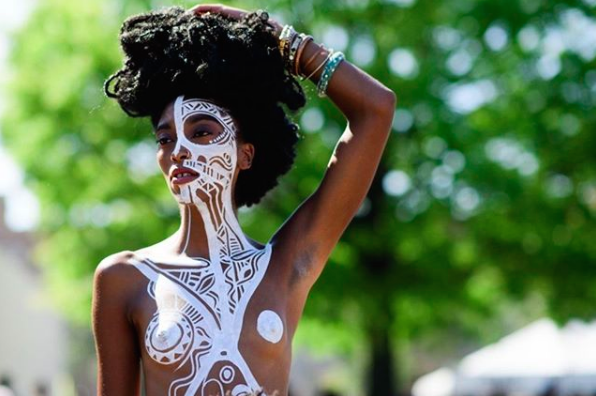Style July 25, 2018
Politics. Power. Punk.


Since its inception 12 years ago in Brooklyn, Afropunk has transformed from a small-scale punk music festival to a cultural phenomenon. Beyond the incredible lineups, fashion is the main attraction of the event. Every hairstyle, every piece of jewelry and every t-shirt slogan makes a statement. And as an event that’s all about celebrating black expression, the politics behind Afropunk aesthetics are just as important as the visual appeal.
The music festival was actually inspired by a documentary film, “Afro-Punk,” (2003) directed by James Spooner. The film follows four black punk rockers and explores African-Americans’ engagement with the white-dominated punk scene. The documentary gained a strong fan base and inspired a whole new wave of black punk culture. This led to Spooner creating the Afropunk music festival in 2005.
Afropunk fashion is just as important as the music, and it is truly a feast for the eye. There are vibrant colors and intricately patterned clothes. Larger-than-life afros. Braids and twists and locs cascading down people’s backs. Body paint. Tattoos and piercings.
To Afropunk attendees, the festival is a space of uninhibited creative expression. Specifically, black creative expression. Paule Oue attended Afropunk in 2017 and told Dazed that “Events like Afropunk are important because they give us a place to be ourselves. To be free with what we choose to wear, what music we want to listen to, to support our brothers and sisters’ businesses, and most of all to celebrate us.”
It is also a space of protest and activism. “We’re literally wearing our movements on our chest,” Michaela Angela Davis told NBC. Davis is a writer, activist and the creator of MAD FREE, a conversation project that focuses creative content featuring women of color. MAD FREE partnered with Gbenga Akinnagbe’s clothing line Liberated People to create a set of pro-feminist t-shirts. Proceeds were donated to nonprofit organizations like Black Women’s Blueprint and Planned Parenthood.
Spoken word poet Staceyann Chin also explained to NBC that in an age where white supremacists feel comfortable enough to march on the streets, Afropunk is critically important. “It is not going to be a fight without push back…Not just marching in the streets, not just raising their fists, not just being angry but, being bright, joyful, black and visible,” Chin said.
If Afropunk fashion is anything, it is visible. Overwhelming color. Outstandingly avant-garde hairstyles. It is an unapologetic celebration of black beauty.
Despite — or perhaps because of — the increasing popularity of the festival, many are concerned that Afropunk has lost its roots. While bantu knots and dashikis are cool, nothing sounds or looks particularly “punk” at Afropunk anymore.
James Spooner himself split with Afropunk in 2008 due to philosophical differences. “It’s challenging to see—like birthing a baby, raising him, and letting it go out and completely disappointing you,” he told Vice. It can’t be ignored; the festival has undergone drastic changes since its inception. Even decidedly non-punk magazines like Vogue and Elle have dedicated entire slideshows to Afropunk fashion.
Of course there is something to be said for the loss of an originally punk space. Still, this shift is not entirely or inherently negative. Afropunk was a space for black engagement with culture outside of the mainstream. To many attendees, it is still that.
As long as these main values are still in place, one could argue, Afropunk is still punk. After all, punk is subversive. It’s about counterculture and rebellion and being in the minority. Despite increasing visibility, black style is still rebellious. Consider the fact that around the globe, black people are still penalized for wearing their natural hair.
Perhaps this is a more optimistic take, but if Afropunk continues to be a space of liberation, the “punk” part is still valid. It’s punk to be unapologetically yourself. It’s punk to embrace rebellion, attitude and community.
And overall, as Afropunk organizer Matthew Morgan told NPR, “It’s punk rock to be black in America.”